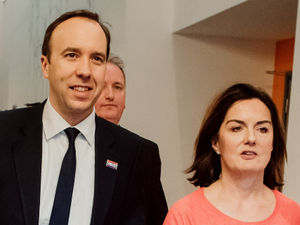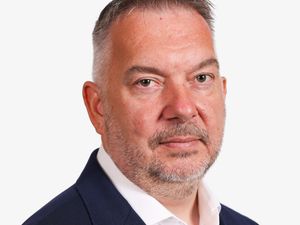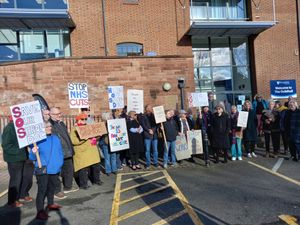Future Fit: Health Minister must intervene in name of equality says Lucy Allan
The Health Secretary has a legal obligation to step in over inequalities between Telford and Shrewsbury, MP Lucy Allan has said.

Ms Allan, who represents Telford, said NHS funding must focus on the area of greatest need.
Her comments come amid calls for the Health Secretary Matt Hancock to call in the decision on Future Fit, which would see Telford’s hospital downgraded to planned care and the county’s main A&E facilities housed in Shrewsbury.
The decision, which comes with £312 million of funding, will also see Telford lose its women and children’s centre.
Last Wednesday Telford & Wrekin Council said it expected a formal objection to Future Fit to be submitted within days.
Ms Allan will raise her concerns during a Westminster Hall debate at 4.30pm today.
Inequality
“When it comes to health outcomes, Telford and Shrewsbury are two ends of the spectrum,” she said.
“If you live in Telford, the premature mortality rate is 25 per cent higher than if you live in Shropshire.
"Children in Telford are far more likely to suffer from obesity, or to be hospitalised for dental decay.
"Tragically rates of suicide and cancer in Telford are significantly higher than in rural Shropshire. Smoking rates, inactivity in adults and other such categories show the same disparity.
“The simple truth is that a shire town in rural England is healthier than a new town.
"So, it is surprising that the local hospital trust will invest most of Future Fit’s £312 million in a state-of-the-art critical care unit in Shrewsbury.
“The solution to the stark injustice of unequal health outcomes is not simply about spending more. Poor health is of course not just about healthcare.
“But if the NHS is overlooking its statutory, constitutional and moral duty to properly consider health inequalities when making major spending decisions, then the Secretary of State has a duty to intervene.”
Spending decisions
During her debate, Ms Allan is expected to ask Mr Hancock to remind hospital trusts generally, as well as the Shrewsbury and Telford Hospital Trust specifically, to regard how spending decisions narrow health inequalities.
She said: “My health trust has repeatedly failed to respond to my questions on health inequalities, treating the issue as somehow irrelevant to their plan.
“NHS trusts that move resource from disadvantaged areas, with high need and poor health, and instead invest heavily in advantaged areas with affluent hinterlands, have a moral and statutory duty to evidence how they are narrowing health inequalities.
“NHS funding must always focus on the greatest need.”
CCG 'committed'
In a joint response David Evans, chief officer for NHS Telford & Wrekin CCG and Dr Simon Freeman, accountable officer for NHS Shropshire CCG said: “Throughout the Future Fit process, Shropshire and Telford & Wrekin CCGs have been committed to fulfilling their equalities duties.
"We have carried out detailed assessments and wide ranging engagement to look at any positive and negative impacts that changes to local hospital services may have on different groups of people.
"This includes people from seldom heard groups, people living in rural areas or areas of deprivation, carers and people whose first language isn’t English.
"The findings of our assessment reports and feedback from our engagement were carefully considered by the Future Fit Programme Board, the Joint HOSC, the CCG Boards and the Joint Committee before making a decision on the future of local hospital services in January 2019.
“It’s important to stress that there are areas of deprivation and health inequalities in areas of Shropshire and mid Wales, as well as in Telford & Wrekin. Rural deprivation is also a particular issue for residents of Powys and rural areas of Shropshire."




